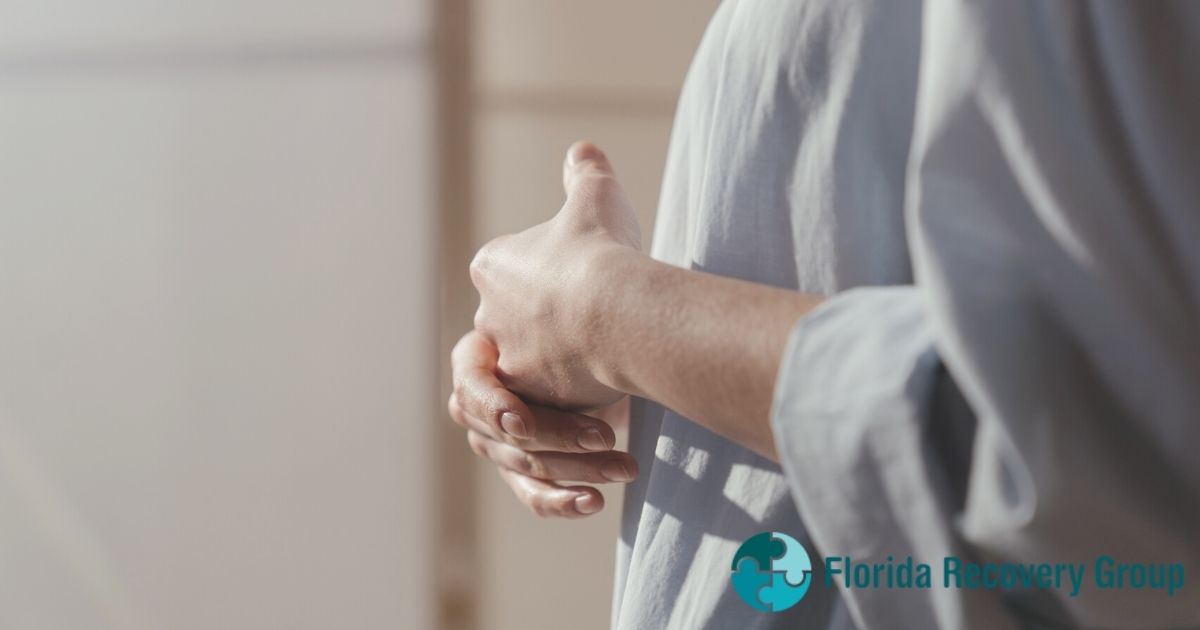
14 Sep The Relationship Between Trauma, PTSD, and Addiction
When trauma, PTSD, and addiction co-occur, it makes the recovery process significantly more difficult. Individuals struggling with PTSD should participate in dual diagnosis treatment programs that integrate trauma-informed care and substance abuse counseling. With the help of a professional treatment program, individuals with PTSD and addiction can learn to recover and cope with their symptoms successfully.
Unfortunately, it seems as if dealing with trauma is a part of the human experience. With approximately 70% of American adults experiencing trauma at least once in their lives, it is clear that this is a common occurrence. Even worse, while experiencing something traumatic is common, it leads to the development of Post-Traumatic Stress Disorder (PTSD).
Luckily, only 3.6% of American adults develop PTSD after experiencing something traumatic. However, this disorder causes an array of uncomfortable symptoms, often causing individuals to self-medicate with drugs and alcohol. As a result, it is imperative that we understand how trauma causes PTSD, how this leads to addiction, and how these issues are treated professionally.
Trauma as it Relates to PTSD
Trauma is defined as an individual experiencing a deeply distressing or disturbing situation. According to the American Psychological Association (APA), trauma is “an emotional response to a terrible event like an accident, rape, or natural disaster”. However, trauma can be caused by any experience that an individual finds frightening or emotionally scarring.
When trauma is left untreated, some individuals develop a condition referred to as Post-Traumatic Stress Disorder (PTSD). As a result, individuals suffering from trauma should seek professional trauma treatment. Any form of physical or psychological trauma can lead to the development of this mental health condition.
Some of the most common causes of PTSD include:
- Military combat
- Violent assault
- Natural disasters
- Sexual assault
- Childhood abuse
- Emotional or physical abuse in a relationship
When an individual has PTSD, they typically experience nightmares or flashbacks related to the unresolved crises. For example, a veteran of war may deal with flashbacks related to their experiences in combat.
The symptoms of PTSD include, but are not limited to:
- Nightmares or flashbacks
- Avoidance of people, places, or things related to the event
- Aggressive behavior or emotional outbursts
- Self-blame or guilt related to the event
- Detachment from others or loss of interest in hobbies
- States of constant hyperarousal or hypervigilance
Unfortunately, when these symptoms are left untreated, many individuals turn to drugs or alcohol to cope. As a result, many individuals diagnosed with PTSD also meet the criteria for substance use disorder or addiction. If you are dealing with PTSD and addiction in Delray Beach, treatment is available.
PTSD and Addiction as Co-Occurring Disorders
Because of the extremely distressing symptoms of PTSD, many individuals turn to drugs or alcohol as a means of escape. Additionally, endorphin withdrawal plays a part in the need for individuals with PTSD to abuse substances. To explain, traumatic events cause an individual’s brain to produce endorphins. Endorphins are the chemicals responsible for reducing pain and creating a sense of wellbeing, helping the individual deal with extreme levels of distress.
However, when the moment is over, the body begins to experience endorphin withdrawal. Surprisingly, endorphin withdrawal has some of the same symptoms as alcohol withdrawal. These symptoms include:
- Anxiety
- Depression
- Emotional distress
- Physical pain
- Increased desire or craving to abuse substances
Research has proven that individuals dealing with endorphin withdrawal as a result of PTSD and trauma are more likely to develop an addiction. However, the positive effects that abusing substances may create will subside quickly. Eventually, individuals self-medicating with alcohol or drugs will begin to become chemically dependent, leading to addiction. Unfortunately, the combination of PTSD and addiction can lead to a vicious cycle of increased symptoms from both disorders.
PTSD and Addiction Treatment in Delray Beach
When an individual suffers from both PTSD and drug or alcohol addiction, they are considered a dual diagnosis patient. Dual diagnosis is a term used to describe an individual who suffers from two or more co-occurring disorders. It is imperative that individuals suffering addiction and PTSD attend individualized dual diagnosis treatment.
Dual diagnosis rehab for PTSD and addiction in Delray Beach offers patients an individualized treatment approach, provided by professional addiction and mental health specialists. Additionally, dual diagnosis treatment programs offer integrative care. In other words, patients receive treatment for addiction and any co-occurring mental health conditions at the same time. As a result, patients are able to make a full recovery.
When looking for a dual diagnosis treatment center, you should make sure that the program includes:
- Individual psychotherapy that teaches the patient how to handle triggers that led them to substance abuse in the past
- Group therapy sessions with other patients who suffer from the same co-occurring disorders as you
- The option to attend family counseling to strengthen relationships and educate family members about your disorders
- Membership in an addiction support group to strengthen the patient’s support network
- Medication therapy including anti-addiction drugs or psychotherapeutic medications
Fortunately, Florida Recovery Group meets all of the previously mentioned requirements. At FRG, we prioritize each and every patient’s individual needs by providing an integrative approach to dual diagnosis treatment. If you or a loved one suffer from addiction and PTSD in Delray Beach or the surrounding areas, look no further. Florida Recovery Group is here to help. Call us today to get started.





